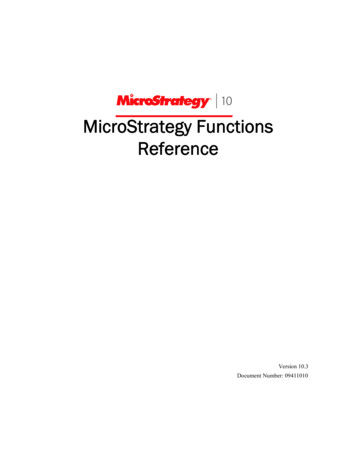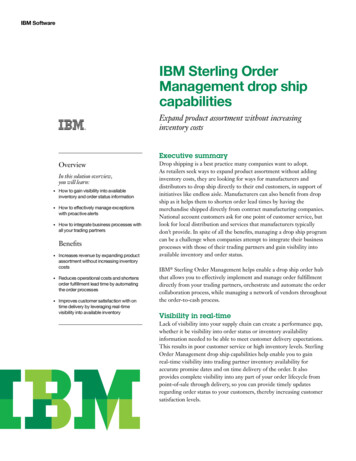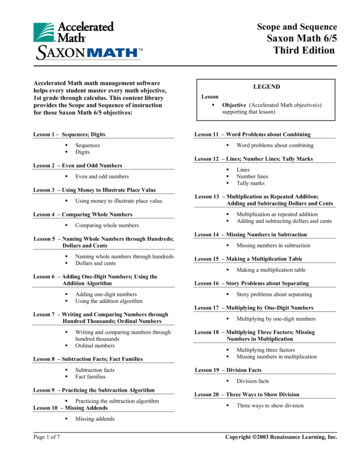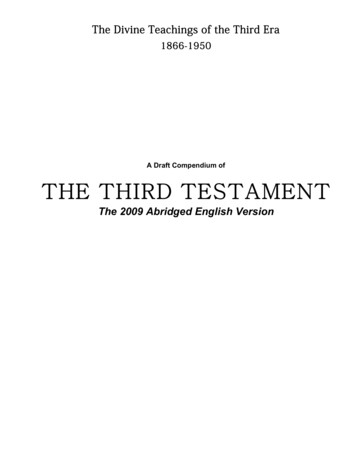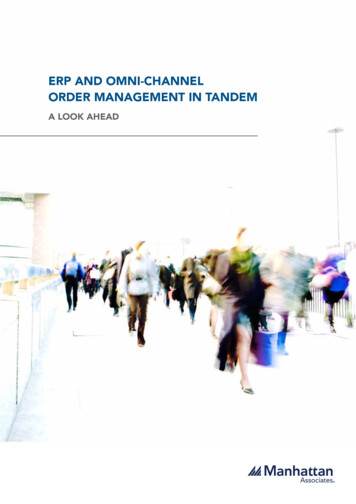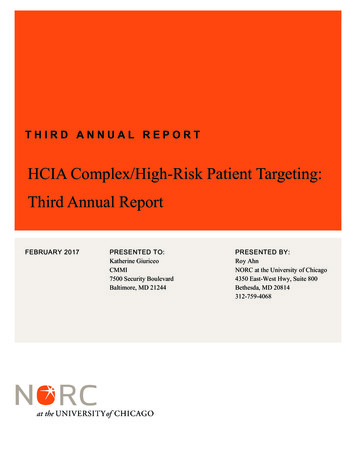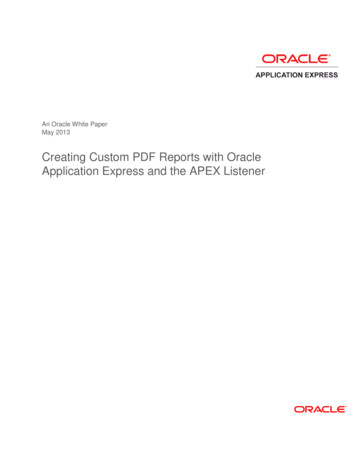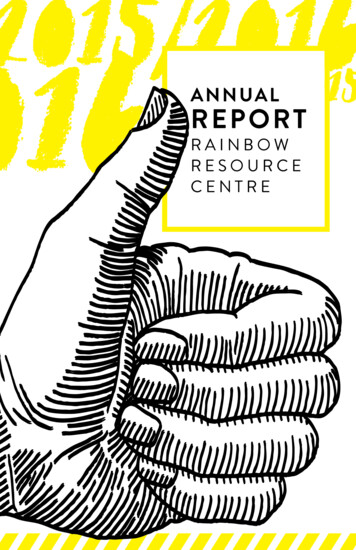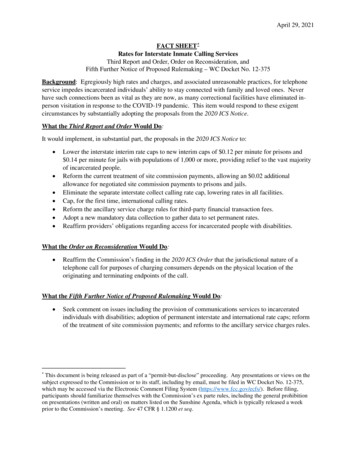
Transcription
April 29, 2021FACT SHEET *Rates for Interstate Inmate Calling ServicesThird Report and Order, Order on Reconsideration, andFifth Further Notice of Proposed Rulemaking – WC Docket No. 12-375Background: Egregiously high rates and charges, and associated unreasonable practices, for telephoneservice impedes incarcerated individuals’ ability to stay connected with family and loved ones. Neverhave such connections been as vital as they are now, as many correctional facilities have eliminated inperson visitation in response to the COVID-19 pandemic. This item would respond to these exigentcircumstances by substantially adopting the proposals from the 2020 ICS Notice.What the Third Report and Order Would Do:It would implement, in substantial part, the proposals in the 2020 ICS Notice to: Lower the interstate interim rate caps to new interim caps of 0.12 per minute for prisons and 0.14 per minute for jails with populations of 1,000 or more, providing relief to the vast majorityof incarcerated people.Reform the current treatment of site commission payments, allowing an 0.02 additionalallowance for negotiated site commission payments to prisons and jails.Eliminate the separate interstate collect calling rate cap, lowering rates in all facilities.Cap, for the first time, international calling rates.Reform the ancillary service charge rules for third-party financial transaction fees.Adopt a new mandatory data collection to gather data to set permanent rates.Reaffirm providers’ obligations regarding access for incarcerated people with disabilities.What the Order on Reconsideration Would Do: Reaffirm the Commission’s finding in the 2020 ICS Order that the jurisdictional nature of atelephone call for purposes of charging consumers depends on the physical location of theoriginating and terminating endpoints of the call.What the Fifth Further Notice of Proposed Rulemaking Would Do: Seek comment on issues including the provision of communications services to incarceratedindividuals with disabilities; adoption of permanent interstate and international rate caps; reformof the treatment of site commission payments; and reforms to the ancillary service charges rules.*This document is being released as part of a “permit-but-disclose” proceeding. Any presentations or views on thesubject expressed to the Commission or to its staff, including by email, must be filed in WC Docket No. 12-375,which may be accessed via the Electronic Comment Filing System (https://www.fcc.gov/ecfs/). Before filing,participants should familiarize themselves with the Commission’s ex parte rules, including the general prohibitionon presentations (written and oral) on matters listed on the Sunshine Agenda, which is typically released a weekprior to the Commission’s meeting. See 47 CFR § 1.1200 et seq.
Federal Communications CommissionFCCCIRC2105-01Before theFederal Communications CommissionWashington, D.C. 20554In the Matter ofRates for Interstate Inmate Calling Services))))WC Docket No. 12-375THIRD REPORT AND ORDER, ORDER ON RECONSIDERATION, ANDFIFTH FURTHER NOTICE OF PROPOSED RULEMAKING Adopted: []Released: []Comment Date: [[30]] days after date of publication in the Federal RegisterReply Comment Date: [[60]] days after date of publication in the Federal RegisterTABLE OF CONTENTSI. INTRODUCTION . 1II. BACKGROUND . 7A. Statutory Background . 8B. History of Commission Proceedings Prior to 2020 . 11C. Judicial Actions. 16D. 2020 Rates and Charges Reform Efforts. 22III. THIRD REPORT AND ORDER . 28A. Unique Marketplace for Telephone Services Provided to Incarcerated People . 31B. Impact on Consumers and Society . 34C. Interim Interstate Rate Cap Components . 391. Eliminating Separate Rate Caps for Collect Calls . 422. Setting a Threshold of 1,000 Average Daily Population for Larger Jails . 463. Accounting for Providers’ Costs . 494. Accounting for Correctional Facility Costs . 1005. Waiver Process for Outliers . 171D. Interim International Rate Caps . 178E. Consistency with Section 276 of the Act . 186F. Cost-Benefit Analysis of Revised Interstate Rate Caps . 195G. Disability Access . 207H. Other Issues. 2101. Ancillary Fee Cap for Single-Call Services and Third-Party Transaction Fees . 2102. Effect on State Regulation . 218 This document has been circulated for tentative consideration by the Commission at its May 20, 2021 openmeeting. The issues referenced in this document and the Commission’s ultimate resolution of those issues remainunder consideration and subject to change. This document does not constitute any official action by theCommission. However, the Acting Chairwoman has determined that, in the interest of promoting the public’s abilityto understand the nature and scope of issues under consideration, the public interest would be served by making thisdocument publicly available. The FCC’s ex parte rules apply and presentations are subject to “permit-but-disclose”ex parte rules. See, e.g., 47 C.F.R. §§ 1.1206, 1.1200(a). Participants in this proceeding should familiarizethemselves with the Commission’s ex parte rules, including the general prohibition on presentations (written andoral) on matters listed on the Sunshine Agenda, which is typically released a week prior to the Commission’smeeting. See 47 CFR §§ 1.1200(a), 1.1203.
Federal Communications CommissionFCCCIRC2105-013. Additional Data Collection . 2194. Effective Dates . 2315. Rule Revisions. 234IV. ORDER ON RECONSIDERATION . 236A. Background . 237B. Discussion . 2411. GTL’s Substantive Arguments Against the End-to-End Analysis Do Not WarrantReconsideration . 2422. GTL’s Procedural Arguments Do Not Warrant Reconsideration . 258V. SEVERABILITY . 262VI. FIFTH FURTHER NOTICE OF PROPOSED RULEMAKING . 263A. Disability Access . 2641. Background . 2652. Making Modern Forms of TRS Available. 2693. Application of Existing TRS Rules . 2854. Charges for TRS Calls. 2895. Direct Video Communication by Incarcerated People with CommunicationDisabilities . 2956. Accessibility-Related Reporting. 301B. Permanently Capping Provider and Facility-Related Rate Components . 3031. Overall Methodology . 3032. Provision of Service to Jails with Average Daily Populations Below 1,000. 3073. Correctional Facility Costs . 311C. Revising Ancillary Service Charges Rules . 325D. Refining International Rate Methodology to Prevent Double Counting . 338E. Recurring Mandatory Data Collection . 342F. Revisions to the Commission’s Definition of “Jail” . 347G. Characteristics of the Bidding Market . 350VII. PROCEDURAL MATTERS . 359VIII. ORDERING CLAUSES . 375I.INTRODUCTION1. Unlike virtually everyone else in the United States, incarcerated people have no choice intheir telephone service provider. Instead, their only option typically is to use a service provider chosen bythe correctional facility, and once chosen, that service provider typically operates on a monopoly basis.Egregiously high rates and charges and associated unreasonable practices for the most basic and essentialcommunications capability—telephone service—impedes incarcerated peoples’ ability to stay connectedwith family and loved ones, clergy, and counsel, and financially burdens incarcerated people and theirloved ones. Never have such connections been as vital as they are now, as many correctional facilitieshave eliminated in-person visitation in response to the COVID-19 pandemic.2. In August 2020, the Commission unanimously adopted a Notice proposing to reduceinterstate rates and, for the first time, to cap international rates. Today, we move forward as proposed,lowering interstate rates and charges for the vast majority of incarcerated people, limiting internationalrates for the first time, and making other reforms to our rules.3. Specifically, the Report and Order: Lowers the interstate interim rate caps of 0.21 per minute for debit and prepaid callsfrom prisons and jails with 1,000 or more incarcerated people to new lower interim capsof 0.12 per minute for prisons and 0.14 per minute for larger jails. Reforms the current treatment of site commission payments to permit recovery only ofthe portions of such payments related specifically to calling services and requires them to2
Federal Communications CommissionFCCCIRC2105-01be separately listed on bills.oWhere site commission payments are mandated by federal, state, or local law,providers may pass these payments through to consumers, without any markup,as an additional component of the new interim interstate per-minute rate caps.oWhere site commission payments result from contractual obligations ornegotiations with providers, providers may recover from consumers no more thanthe 0.02 per minute for prisons and 0.02 per minute for larger jails, asproposed in the 2020 ICS Notice.oTherefore, consistent with the proposal in the 2020 ICS Notice, the maximumtotal interstate rate caps are 0.14 per minute for prisons and 0.16 per minute forjails with 1,000 or more incarcerated people. Eliminates the current interim interstate collect calling rate cap of 0.25 per minuteresulting in a single uniform interim interstate maximum rate cap of 0.21 per minute forall calls for all facilities, consistent with the proposal in the 2020 ICS Notice. Caps, for the first time, international calling rates at the applicable total interstate ratecap, plus the amount paid by the calling services provider to its underlying wholesalecarriers for completing international calls, consistent with the 2020 ICS Notice. Reforms the ancillary service third-party transaction fee caps for (1) calls that are billedon a single per-call basis, and (2) charges for transferring or processing third-partyfinancial transactions, as proposed in the 2020 ICS Notice. Adopts a new mandatory data collection to obtain more uniform cost data based onconsistent prescribed allocation methodologies to determine reasonable permanent costbased rate caps for facilities of all sizes, as suggested in the 2020 ICS Notice. Reaffirms providers’ obligations regarding functionally equivalent access for incarceratedpeople with disabilities, consistent with the 2020 ICS Notice and federal law.4. Next, we adopt an Order on Reconsideration denying GTL’s petition for reconsideration ofthe 2020 ICS Order on Remand, and reiterate that the jurisdictional nature of a telephone call for purposesof charging consumers depends on the physical location of the originating and terminating endpoints ofthe call. To the extent the endpoints of any particular call could be either intrastate or interstate and suchendpoints are not known or easily knowable, consistent with our precedent, rates or charges for such callsmay not exceed any applicable federally prescribed rates or charges.5. Finally, we adopt a Fifth Further Notice of Rulemaking to obtain evidence necessary to makefurther progress toward accomplishing the critical work that remains. To that end, the Further Noticeseeks more detailed comments from stakeholders, including but not limited to, about the provision ofcommunications services to incarcerated people with hearing and speech disabilities; the methodology tobe employed in setting permanent interstate and international rate caps; general reform of the treatment ofsite commission payments in connection with interstate and international calls; the adoption of an ongoing periodic cost data collection to ensure rates are just and reasonable; and additional reforms to ourancillary service charges rules.6. We expect today’s actions to have immediate meaningful and positive impacts on the abilityof incarcerated people and their loved ones to satisfy our universal, basic need to communicate.11Although we use various terminology throughout this item to refer to the intended beneficiaries of our actionsherein, unless context specifically indicates otherwise, these beneficiaries are broadly the people placing andreceiving inmate calling services (ICS) calls, whether they are incarcerated people, members of their family, or otherloved ones and friends. We also may refer to them, generally, as consumers.3
Federal Communications CommissionII.FCCCIRC2105-01BACKGROUND7. Access to affordable communications services is critical for everyone in the United States,including incarcerated members of our society. Studies have long shown that incarcerated people whohave regular contact with family members are more likely to succeed after release and have lowerrecidivism rates. Because correctional facilities generally grant exclusive rights to service providers,incarcerated people must purchase service from “locational monopolies” and subsequently face rates farhigher than those charged to other Americans.A.Statutory Background8. The Communications Act of 1934, as amended (Communications Act or Act) dividesregulatory authority over interstate, intrastate, and international communications services between theCommission and the states.2 Section 2(a) of the Act empowers the Commission to regulate “interstate andforeign communication by wire or radio.”3 This regulatory authority includes ensuring that “[a]ll charges,practices, classifications, and regulations for and in connection with” interstate or internationalcommunications services are “just and reasonable” in accordance with section 201(b) of the Act.4 Section201(b) also provides that “[t]he Commission may prescribe such rules and regulations as may benecessary in the public interest to carry out” these provisions.59. Section 2(b) of the Act preserves states’ jurisdiction over “charges, classifications, practices,services, facilities, or regulations for or in connection with intrastate communication service.”6 TheCommission is thus “generally forbidden from entering the field of intrastate communication service,which remains the province of the states.”7 Stated differently, section 2(b) “erects a presumption againstthe Commission’s assertion of regulatory authority over intrastate communications.”810. Section 276 of the Act directs the Commission to prescribe regulations that ensure thatpayphone service providers, including inmate calling services providers, “are fairly compensated for eachand every completed intrastate and interstate call using their payphone.”9 Although theTelecommunications Act of 1996 (1996 Act) amended the Act and “chang[ed] the FCC’s authority withrespect to some intrastate activities,”10 with respect to section 276, the U.S. Court of Appeals for theDistrict of Columbia Circuit has held that “the strictures of [section 2(b)] remain in force.”11Accordingly, that court concluded that section 276 does not authorize the Commission to determine “justand reasonable” rates for intrastate calls, and that the Commission’s authority under that provision to2E.g., Global Tel*Link v. FCC, 866 F.3d 397, 402 (D.C. Cir. 2017) (GTL v. FCC or GTL).347 U.S.C. § 152(a).447 U.S.C. § 201(b).5Id.647 U.S.C. § 152(b).GTL v. FCC, 866 F.3d at 403 (quoting New England Pub. Commc’ns Council, Inc. v. FCC, 334 F.3d 69, 75 (D.C.Cir. 2003) (citing 47 U.S.C. § 152(b)).7Id. at 403, 409; see also id. at 403 (“This is ‘not only a substantive jurisdictional limitation on the FCC’s power,but also a rule of statutory construction’ in interpreting the Act’s provisions.” (quoting La. Pub. Serv. Comm’n v.FCC, 476 U.S. 355, 373 (1986) (Louisiana Public Service Commission))).847 U.S.C. § 276(b)(1)(A); see also 47 U.S.C. § 276(d) (defining “payphone service” to include “the provision ofinmate telephone service in correctional institutions, and any ancillary services”). The statute explicitly exemptstelecommunications relay service calls for hearing disabled individuals from the requirement that providers must becompensated for “each and every” completed call. Id. § 276(b)(1)(A).910GTL v. FCC, 866 F.3d at 403.11Id.4
Federal Communications CommissionFCCCIRC2105-01ensure that providers “are fairly compensated” both for intrastate and interstate calls does not extend toestablishing rate caps on intrastate services.12B.History of Commission Proceedings Prior to 202011. In 2003, Martha Wright and her fellow petitioners, current and former incarcerated peopleand their relatives and legal counsel (Wright Petitioners), filed a petition seeking a rulemaking to address“excessive” inmate calling services rates.13 The petition sought to prohibit exclusive inmate callingservices contracts and collect-call-only restrictions in correctional facilities.14 In 2007, the WrightPetitioners filed an alternative petition for rulemaking in which they emphasized the urgency of the needfor Commission action due to “exorbitant” inmate calling services rates.15 The Wright Petitionersproposed benchmark rates for interstate long distance inmate calling services calls and reiterated theirrequest that providers offer debit calling as an alternative option to collect calling.16 The Commissionsought and received comment on both petitions.1712. In 2012, the Commission commenced an inmate calling services rulemaking proceeding byreleasing the 2012 ICS Notice seeking comment on, among other matters, the proposals in the WrightPetitioners’ petitions and whether to establish rate caps for interstate inmate calling services calls.1813. In the 2013 ICS Order, in light of record evidence that rates for calling services used byincarcerated people greatly exceeded the reasonable costs of providing those services, the Commissionadopted interim interstate rate caps of 0.21 per minute for debit and prepaid calls and 0.25 per minutefor collect calls.19 In the First Mandatory Data Collection, the Commission required all inmate callingservices providers to submit data on their underlying costs so that the agency could develop permanentId. at 409-12. Judge Pillard dissented from this view, finding permissible the Commission’s contraryinterpretation of the meaning of “fairly compensated” in section 276. Id. at 419-23 (Pillard, J., dissenting).1213Petition for Rulemaking or, in the Alternative, Petition to Address Referral Issues in Pending Rulemaking, CCDocket No. 96-128, at 1 (filed Nov. 3, 2003), https://ecfsapi.fcc.gov/file/6515782164.pdf.14Id. at 3.Petitioners’ Alternative Rulemaking Proposal, CC Docket No. 96-128, at 2 (filed Mar. 1, 1516Id. at 5, 10.17Comment Sought on Alternative Rulemaking Proposal Regarding Issues Related to Inmate Calling Services, CCDocket No. 96-128, Public Notice, 22 FCC Rcd 4229 (WCB 2007); Petition for Rulemaking Filed Regarding IssuesRelated to Inmate Calling Services; Pleading Cycle Established, CC Docket No. 96-128, Public Notice, DA 034027, 2003 FCC LEXIS 7261 (WCB 2003).18Rates for Interstate Inmate Calling Services, WC Docket No. 12-375, Notice of Proposed Rulemaking, 27 FCCRcd 16629, 16629-30, 16636, paras. 1, 17 (2012) (2012 ICS Notice).19These interim interstate rate caps were first adopted in 2013, Rates for Inmate Calling Services, WC Docket No.12-375, Report and Order and Further Notice of Proposed Rulemaking, 28 FCC Rcd 14107, 14111, para. 5 (2013)(2013 ICS Order), and readopted in 2015, Rates for Inmate Calling Services, WC Docket No. 12-375, SecondReport and Order and Third Further Notice of Proposed Rulemaking, 30 FCC Rcd 12763, 12770, para. 9 tbl. 1(2015) (2015 ICS Order or 2015 ICS Notice), and remain in effect as a result of the vacatur, by the D.C. Circuit, ofthe permanent rate caps adopted in the 2015 ICS Order. GTL v. FCC, 866 F.3d at 404. Under the Commission’srules, “Debit Calling” means “a presubscription or comparable service which allows an Inmate, or someone actingon an Inmate's behalf, to fund an account set up [through] a Provider that can be used to pay for Inmate CallingServices calls originated by the Inmate.” 47 CFR § 64.6000(g). “Prepaid calling” means “a presubscription orcomparable service in which a Consumer, other than an Inmate, funds an account set up [through] a Provider ofInmate Calling Services. Funds from the account can then be used to pay for Inmate Calling Services, includingcalls that originate with an Inmate.” Id. § 64.6000(p). “Collect calling” means “an arrangement whereby the calledparty takes affirmative action clearly indicating that it will pay the charges associated with a call originating from anInmate Telephone.” Id. § 64.6000(d).5
Federal Communications CommissionFCCCIRC2105-01rate caps.20 In the 2014 ICS Notice, the Commission sought comment on reforming charges for servicesancillary to the provision of inmate calling services and on establishing rate caps for both interstate andintrastate calls.2114. The Commission adopted a comprehensive framework for interstate and intrastate inmatecalling services in the 2015 ICS Order, including limits on ancillary service charges22 and permanent ratecaps for interstate and intrastate inmate calling services calls in light of “egregiously high” rates forinmate calling services calls.23 The Commission set tiered rate caps of 0.11 per minute for prisons; 0.14 per minute for jails with average daily populations of 1,000 or more; 0.16 per minute for jails withaverage daily populations of 350 to 999; and 0.22 per minute for jails having average daily populationsof less than 350.24 The Commission calculated these rate caps using industry-wide average costs based ondata from the First Mandatory Data Collection and stated that this approach would allow providers to“recover average costs at each and every tier.”25 The Commission also readopted the interim interstaterate caps it had adopted in 2013, and extended them to intrastate calls, pending the effectiveness of thenew rate caps, and sought comment on whether and how to reform rates for international inmate callingservices calls.26 At the same time, the Commission adopted a Second Mandatory Data Collection to202013 ICS Order, 28 FCC Rcd at 14111-12, paras. 5, 7.21Rates for Interstate Inmate Calling Services, WC Docket No. 12-375, Second Further Notice of ProposedRulemaking, 29 FCC Rcd 13170, 13179, para. 19 (2014) (2014 ICS Notice). Ancillary service charges are fees thatproviders assess on calling services used by incarcerated people that are not included in the per-minute ratesassessed for individual calls. 47 CFR § 64.6000(a).222015 ICS Order, 30 FCC Rcd at 12838-39, paras. 144-45. Because of continued growth in the number and dollaramount of ancillary service charges that inflated the effective price paid for inmate calling services, the Commissionlimited permissible ancillary service charges to only five types and capped the charges for each: (1) Fees for SingleCall and Related Services—billing arrangements whereby an incarcerated person’s collect calls are billed through athird party on a per-call basis, where the called party does not have an account with the inmate calling servicesprovider or does not want to establish an account; (2) Automated Payment Fees—credit card payment, debit cardpayment, and bill processing fees, including fees for payments made by interactive voice response, web, or kiosk;(3) Third-Party Financial Transaction Fees—the exact fees, with no markup, that providers of calling services usedby incarcerated people are charged by third parties to transfer money or process financial transactions to facilitate aconsumer’s ability to make account payments via a third party; (4) Live Agent Fees—fees associated with theoptional use of a live operator to complete inmate calling services transactions; and (5) Paper Bill/Statement Fees—fees associated with providing customers of inmate calling services an optional paper billing statement. 47 CFR§§ 64.6000(a), 64.6020.23The Commission relied on section 276 and section 201(b) of the Act to adopt its rate caps for both intrastate andinterstate inmate calling services. 2015 ICS Order, 30 FCC Rcd at 12768, 12813-18, paras. 7, 106-16.24Id. at 12775, para. 22.252015 ICS Order, 30 FCC Rcd at 12790, para. 52 & n.170. The Commission did not include site commissionpayments in its permanent rate caps finding these payments were not costs reasonably related to the provision ofinmate calling services. See 2015 ICS Order, 30 FCC Rcd at 12818-19, paras. 117-18; see also 2013 ICS Order, 28FCC Rcd at 14124-25, paras. 33-34 (describing site commissions as “payments made from [inmate calling services]providers to correctional facilities and related state authorities” and recognizing that such payments “can take theform of a percentage of gross revenue, a signing bonus, a monthly fixed amount, yearly fixed amount, or in-kindcontributions”); Implementation of Pay Telephone Reclassification & Compensation Provisions of theTelecommunications Act of 1996, CC Docket No. 96-128, Order on Remand and Notice of Proposed Rulemaking,17 FCC Rcd 3248, 3262, para. 38 (2002) (2002 Pay Telephone Order) (describing site commissions as “locationrents that are negotiable by contract with the facility owners and represent an apportionment of profits between thefacility owners and the providers of the inmate payphone service”).262015 ICS Order, 30 FCC Rcd at 12769, 12771, paras. 9, 11; see also Wireline Competition Bureau AddressesApplicable Rates for Inmate Calling Services and Effective Dates for Provisions of the Inmate Calling ServicesSecond Report and Order, WC Docket No. 12-375, Public Notice, 31 FCC Rcd 2026, 2026-28 (WCB 2016).6
Federal Communications CommissionFCCCIRC2105-01identify trends in the market and form the basis for further reform as well as an annual filing obligationre
Eliminate the separate interstate collect calling rate cap, lowering rates in all facilities . Cap, for the first time, international calling rates . Reform the ancillary service charge rules for third-party financial transaction fees. Adopt a new mandatory data collection to gather data to set permanent rates.



